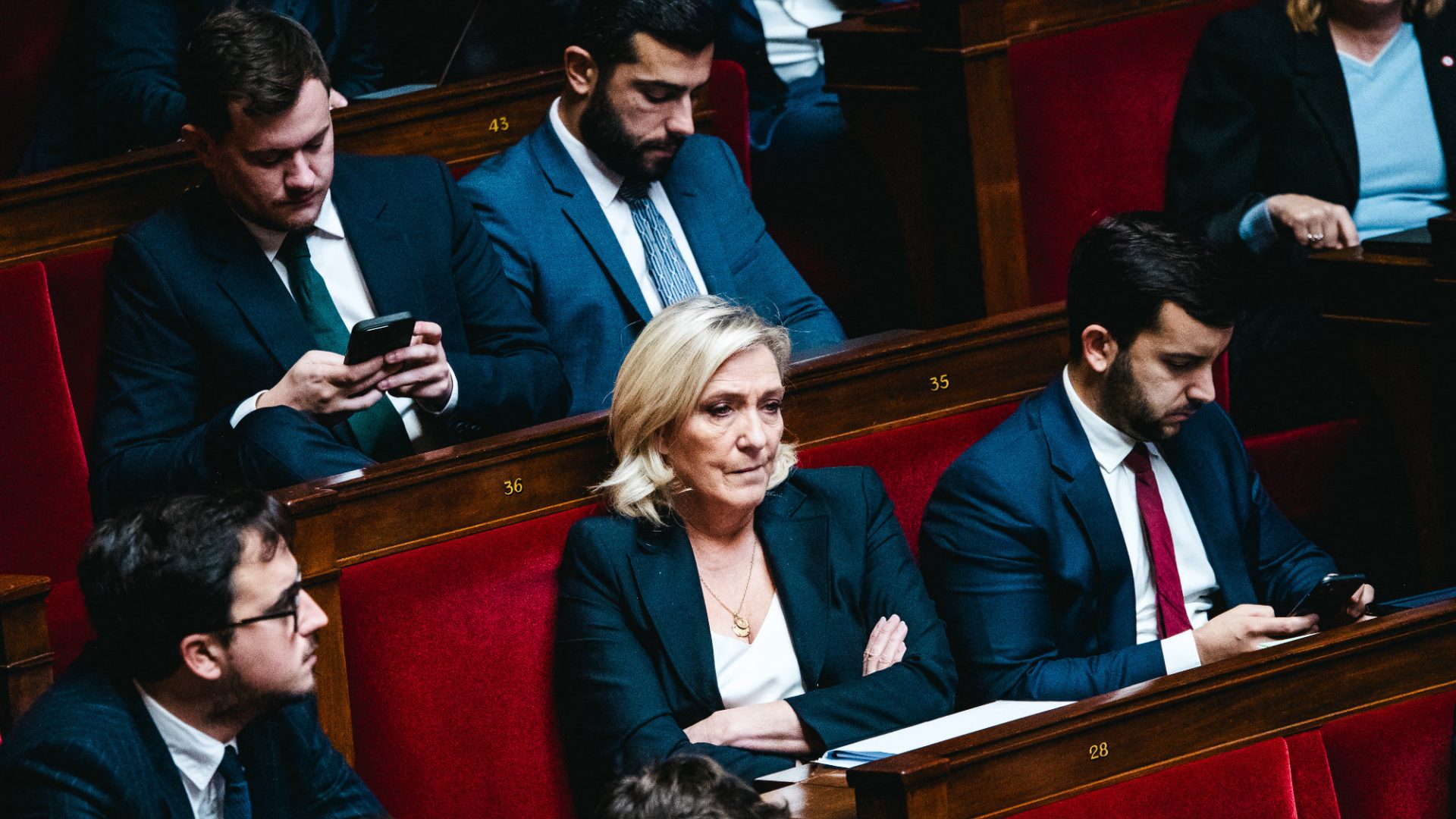On Wednesday December 4, a thumb was lowered to signal a gladiator’s death in the arena. That arena was France’s national assembly, the gladiator’s name was Michel Barnier and the thumb’s owner was Marine
Le Pen.
The prime minister’s death warrant had come in the shape of a motion of censure submitted by the left but Le Pen’s hard right Rassemblement National signed it. It was a historic moment that sent French politics, already in chaos, one step further into the unknown.
Photographer Henri Szwarc even captured a symbolic image of Le Pen, arm outstretched and thumb down, just before the debate. There was a stark contrast with another picture taken of her a few weeks earlier.
That one showed a less triumphant Marine Le Pen, again pictured in her seat on the far right of the parliamentary chamber. She has a pensive, worried look. Her features are drawn, her dark circles deep. She seems lonely, almost lost, a far cry from the sarcastic jeers and proud posturing she has made a speciality of.
At the time, Le Pen had plenty to worry about, not least the health of her father Jean-Marie Le Pen, 96 years old. The totem of the French extreme right – he is nicknamed “The Menhir” – was hospitalised at the beginning of the month in the Paris region, officially for tests.
The relationship between father and daughter is charged and passionate, both emotionally and politically. With the man who founded the Front National in 1972, whom she succeeded before renaming the party under the milder name of Rassemblement National (National Rally), they alternated between effusions of affection and bloody rifts.
When she became president of the FN, her strategy of de-demonisation led her in 2015 to expel her father from the party, who was all too eager with racist and antisemitic provocations. He denounced this act of “felony”, this “disgraceful ambush”, this “political assassination” and took the FN to court, without success.
But in a family brought up on the violence that feeds its ideology, anger cannot take precedence over solidarity and the pull of the tribe. “We’re worried because we love him,” Marine said on November 13, when asked about her father’s hospitalisation.
That same day brought more bad news. It was the day the prosecutor delivered her closing arguments in the Paris trial of Le Pen and 24 colleagues in the RN – party officials, employees, former deputies and their parliamentary assistants.
All had been on trial since September 30, accused of having set up a “system of misappropriation” of money paid by the European Union for the recruitment of parliamentary staff. They were accused of using the cash – the equivalent of almost £5.8m – to finance their party’s political activities between 2004 and 2016.
For almost two months, from 30 September to 27 November, Le Pen attended the trial, escaping during recess to check on her father’s health by phone. On November 13, she sat in court, face tense, in the front row of the defendants.
The prosecutor, Nicolas Barret, said that the former FN president was at the “centre” of an “organised system” designed to make the European Parliament the far right party’s “cash cow”. He asked for Le Pen to be given five years’ imprisonment, of which three would be suspended, plus a fine of €300,000 (nearly £250,000) and five years’ ineligibility from standing for political office, with immediate application even in the event of an appeal. If the judges agree, this would prevent her from standing in the next presidential election, which is due by April 2027.
Marine Le Pen did not wish to say any “last words” in court. She appeared in shock. Two days later, on the TF1 television channel, she summoned Trumpian rhetoric to describe the prosecutor’s case against her as a “very violent attack on democracy” and declared: “They are calling for my political death”.
On December 5, in an interview on the CNews channel owned by her businessman supporter Vincent Bolloré, her emotion was palpable as she spoke of her potential ineligibility.
The two images of Marine Le Pen taken three weeks apart offer a key to explaining her spectacular change of strategy. Gone is the process of “de-demonisation” and “respectability” of the Rassemblement National that she implemented with Jordan Bardella, the party’s young president. Between the prosecutor delivering his indictment on November 13 and her decision to give Barnier the thumbs-down on December 4, the three-time presidential candidate has abandoned what was dubbed her “tie strategy”.
This order to RN MPs to wear wise, responsible and cravatée (at least for the men) attire in parliament has proved remarkably effective. It succeeded in making the Rassemblement National, a party that emerged from the depths of the far right, appear to be a party of government, and to distinguish it from the clownish barking of La France Insoumise, its far left counterpart.
It had made RN the leading party on the right and the leading party in the national assembly. It had installed it as the master of the game in French politics, making it more than possible for Marine to be elected president of the Republic.
That strategy was shattered by the court case. Marine Le Pen reacted like a wounded animal to the threat of a heavy sentence, as if she had nothing left to lose but to return to her original self: chaos rather than responsibility.
Of course, she and all her cronies swear wholeheartedly that the decision to censure the government has no other motivation than “defending the French” and saving them from “M Barnier’s appalling budget”. But for Le Pen, the equation is clear: why continue to try her luck in the presidential election in a “respectable” manner, if it means being rendered ineligible as soon as the court’s ruling is handed down on March 31 – even before the possibility of triggering new national assembly elections?
Two other events strengthened her determination to change strategy. Firstly, the Bardella problem. Her 29-year-old successor, whom she herself promoted and who, thanks to his campaigning on TikTok is hugely popular among young people, has become too prominent not to annoy her mentor.
The autobiography of this smiling, well-groomed young man, whose publication was opportunely brought forward to coincide with the trial of Front National MEPs, has immediately topped the bestseller lists. Le Pen did not appreciate seeing Bardella strutting around France plugging his book and signing it in front of queues dozens of metres long, while she was in the courtroom.
She was even less pleased to hear the 29-year-old RN president declare on November 16 that his “number one rule for anyone wishing to be a member of parliament of the Republic” was “not to have a criminal record”. Was this a slip of the tongue? Or a direct jab at Le Pen? In any case, it was enough to fuel her mistrust.
“This is kicking someone when they’re down or, if you prefer, Brutus killing his mother,” said one left wing MP. Another, from Macron’s party, said: “You’ll have to go and get Freud from his grave to explain this.”
The other event that confirmed Le Pen’s change of strategy was Trump’s election as US president on November 5, quickly circumventing his own legal troubles. This huge knock-on effect gave wings to every nationalist-populist on the planet, including Marine Le Pen.
With the president-elect, to whom she is ideologically close, she now has another thing in common: a potential criminal record. And she has the same game to play: the Trumpist strategy.
This starts with calling into question the justice system, allegedly manipulated by the elites and the deep state, in the name of a “people” who alone hold the truth. Populism at its best.
Her lawyer argued that the prosecutor had cast “doubt on the very intentions of the judiciary”. Le Pen has spoken of the insult inflicted on 13 million voters by a court that wanted her “politically dead”.
She is quick to forget that the prosecutor’s indictment, which she wants to pass off as a political trial, merely reflects the strict application of the law. She forgets that she herself approved the law adding ineligibility to convictions of political figures.
And she forgets that she loudly applauded ineligibility sentences handed down to opposing figures from the right to the left, including former prime minister Alain Juppé and former budget minister Jérôme Cahuzac.
She even forgets her own statements of the past, one of which is worth its weight in gold. In a clip from a 2004 appearance on the France 2 channel, a Marine Le Pen with long blonde hair can be seen exclaiming: “Everyone has taken money from the coffers except the Front National. And we think that’s normal? The French are fed up with elected representatives embezzling money. It’s scandalous!” This has not aged well.
There is no guarantee that her Trumpist strategy of leading a political destabilisation operation will pay off. The desire to get Macron and his gang out is undeniably present in part of the Rassemblement National electorate. But according to various polls, half of RN voters, approving of the “tie strategy” and keen for Le Pen to unite the right and win the presidency, did not approve of her causing the government to fall.
The first penalty for Le Pen’s actions came on Sunday December 8. In a by-
election in the Ardennes constituency, the Rassemblement National candidate was defeated by his Macronist rival.
It was quite a blow for Le Pen, who in the space of a weekend had lost an MP and the Syrian dictator Bashar al-Assad, whom she has always ardently defended in the media, along with her other friend Vladimir Putin. And all this while Brutus Bardella, who is keeping a low profile, waits backstage for his turn.
On the other hand, she has already won by plunging France into political chaos, with the complicity of the left. Both she and leftist leaders including Jean-Luc Mélenchon will torment whoever Macron appoints as prime minister in the ultimate hope that an exhausted president will resign and one of them will take his place
At 10am on March 31, Marine Le Pen will find out her legal and political fate. Will France have a budget by then? A government? A president?




